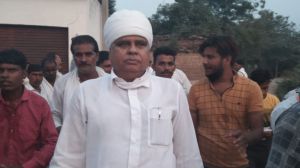No turning back
What began as a debate that unleashed hopes of a transformation in the BJP must not end as a minor drama. On the face of it, L.K. Advani has...

What began as a debate that unleashed hopes of a transformation in the BJP must not end as a minor drama. On the face of it, L.K. Advani has withdrawn his resignation, and the BJP in its statement has simply reiterated its old shibboleths. It would appear that the slow and exhausting compromise reached between president and party is entirely framed within the most conventional Hindu nationalism. Pakistan must be lauded only for inviting Advani to inaugurate the restoration of Punjab8217;s oldest temples; Advani himself must be commended only for reiterating the BJP8217;s stand on terrorism 8212; and Mohammed Ali Jinnah must be criticised for his 8220;two-nation8221; theory and for all the displacement and bloodshed of Partition. The BJP, it may seem, has returned to its old equilibrium, with its Iron Man at the helm and its arsenal of identity politics on the ready.
That equilibrium 8212; such as it may be 8212; is going to be tested. And to Advani has fallen the task of stabilising his party around a more viable agenda of political mobilisation. In the course of his Pakistan visit Advani has framed a question so large and so urgent that BJP simply cannot return to the comforts of ten days ago. And in placing the choice before his party, Advani has set such a standard for himself that smooth settlement with his detractors is not an option. That choice, it bears emphasis, is not about Jinnah8217;s secularism. No, Advani has shown his party the larger political space it could occupy and the independence of thought and action it could claim. Divisions that surfaced in the Sangh Parivar last week make the modalities of that choice clear. To make a bid for the middle-right ground in Indian politics, the BJP must leave the steadying rail at the extreme right. To modernise itself and move beyond the diminishing returns of hardline Hindutva and strident Islamophobia, it must reach out courageously to erstwhile phantoms. If Jinnah is one of them, so be it.
On his return from Pakistan, Advani stressed that he had not said or done anything in Pakistan which needed to be retracted or reviewed. A day after he withdrew his resignation as BJP president, he said that the past 15 days had been a significant learning experience. He must know that in Karachi he placed a bar for himself, for a shift to an inclusive politics. All that he says and does now will be measured against his Karachi line. He will certainly wonder whether he chose the wrong moment8212;or the wrong method8212;to change his party and draw lines of separation between BJP and Sangh. Still, this task begun, even if through an entry in a visitors8217; book in Karachi, is wise. Whether Advani meant what he said in Karachi and on his return will only be measured by what he does.
- 01
- 02
- 03
- 04
- 05































